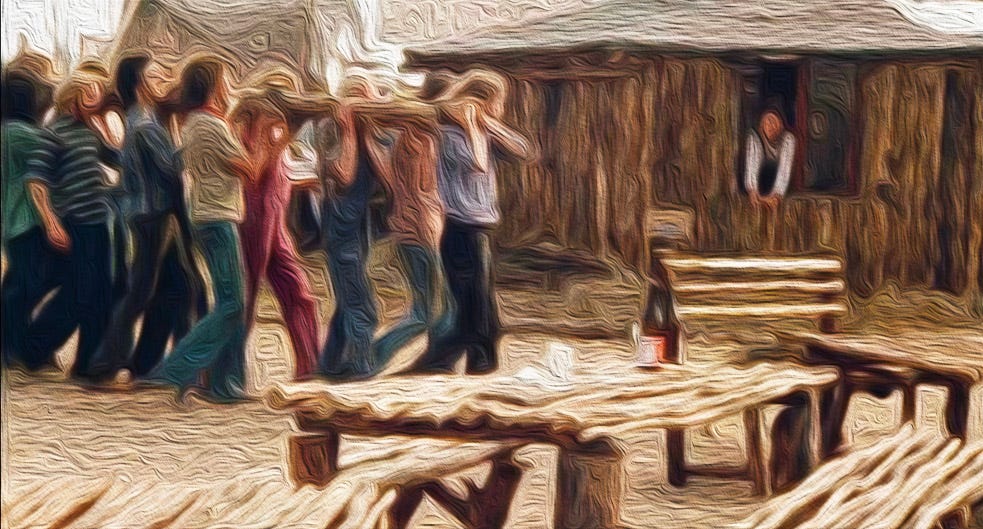The Great Pause Week 56: The Upside of Work
"Unicorns and angels are real, and anyone could become rich just for being famous."

We pretend to work and they pretend to pay us.
— expression in the Soviet era
In his breakthrough role as beatnik Maynard G. Krebs on “The Many Loves of Dobie Gillis,” actor Bob Denver had an audible brand. He was unable to say the word, “work,” without a voice break, the inflected half of the word rising a couple octaves. That speech impediment was generally understood by a 1959 TV audience as denoting the beatnik aversion to labor, a false stereotype, not unlike later tropes about dirty hippies or pacifists spitting on veterans.
During the 2020 election cycle, Democrat Andrew Yang tried to explain how Krebs was not wrong, just 50 years early:
“We are in the midst of the greatest calamity in generations. Tens of millions of jobs are gone — for good. We’ve seen 10 years’ worth of change in the last 10 weeks. Forty-two percent of the jobs lost during [the pandemic] are not returning.”
Before Covid, half of all USAnians were employed in five sectors:
Sales/retail
Food service/food prep
Truck driving/transportation
Manufacturing jobs
Covid devastated anything related to travel or hospitality. In the next decade, robotics, artificial intelligence, nanotechnology, biotechnology, machine-to-machine communication and 3D printing will destroy much of the rest. Yang merely narrated the Fourth Industrial Revolution for those who don’t stay current with such things. He said we needed to retool, reduce the work week, and move to Universal Basic Income. Work less and work smarter. Work, at least in the way Maynard G. Krebs thought of it — and most conservatives still do — is over.
The Universal Basic Income idea has been around for almost as long as Dobie Gillis. In Alaska they call it the Permanent Fund, a subsidy every resident receives from the State’s lucrative oil and gas extraction fees. In Cherokee, North Carolina, it is the check every tribal member gets from Indian casino revenues. Both those places defied conservative predictions. UBI lifted children out of poverty and kept them from lost lives in welfare lines, prison, or the military.
Lately I have been partaking in the invitation-only app for iPhones, soon to be on Android, called Clubhouse. The app is like Burning Man without the sand or psilocybin. While I find it a bit of a mire with way too many people having way too much idle time — like what royal courts must have been like in the 18th Century? — it also provided a rapid tour of the culture of Silicon Valley c. 2021. It is a shame it cannot be preserved in amber.
I was struck by the fragility of it all.
Imagine you have 90,000 followers on Linked-In, your podcast has a million downloads, your YouTube channel has global subscribers, your Clubhouse room and your Twitter feed have tons of followers, you have a couple PAs to return your DMs, and your brand is locked and loaded for sale to the highest bidder any time you are ready. You are thinking 7 or 8 figures could tempt you, maybe when it stops being fun.
Then a previously uncharted comet leaves an EMF wake that fries phones over one third of the planet, wiping clean the internet until it can be rebuilt EMF-proof.
Or, maybe something a little more probable — while you were scanning Google Analytics for the latest eyeball valuations at your posh rental in one of the forested burbs outside Santa Monica or Melbourne there comes a midnight knock on the door and you have to flee in your pajamas and return two days later to sift through the ashes of everything you owned.
My daughter was not even in the 1000-year floodplain when a flood wrecked her house in Nashville a few years ago. She rebuilt, sold it and moved to higher ground. Last month her old house got its second 1000-year flood.
Andrew Yang is right about one thing. This is not your daddy’s world anymore, kids. Most GEN Z’ers know that if they skip the old path of cubicles and assembly lines and can succeed as influencers, the lucky among them will build a 7-figure side hustle while spinning at the gym listening to World Beat. Unicorns and angels are real, and anyone could become rich just for being famous.
So what happens when a bot uploaded by a teenager in a chat room in Turkey drops a worm into all the national electric reliability networks and puts them down permanently? Or maybe that same teen has access to a school CRISPR lab and she inserts a gene into a bacterium that lets it eat through all the world’s grains before her high school teacher can engineer a hunter-killer?
What happens when a supervolcano freezes equatorial latitudes for successive summers? Or instead of an Evergreen container ship getting stuck in the Suez Canal, a war with Iran blocks the Straits of Hormuz, cutting off half of the world’s oil?
If any of those happened, we would enter that cyclical phase of history, be it Mayan, Mongol, or Modern, where the macro mega-system can’t inflate anymore. Attempts to compensate for de-growth with debt, ie: borrowing from the future, will run their course. Then the Ponzi scheme runs out of fresh meat. Ironically, it may not even require some catastrophic event. It could already be baked in the cake we are brunching on.
In 1970… [the] hippies learned the ancient virtues of hard work, good hygiene, and crop rotation.— Jim Windolf, Sex, Drugs and Soybeans, Vanity Fair Green Issue, 2007.
As James Howard Kunstler recently observed, debt only works in the youthful growth phases of economic pulsation, when the prospect of being paid back is statistically favorable.
Now in the elder de-growth phase, the prospect of paying back debts, or even servicing the interest, is statistically dismal. The amount of racked-up debt worldwide has entered the realm of the laughable. So, the roughly twenty-year experiment in Central Bank credit magic, as a replacement for true capital formation, has come to its grievous end.
Modern Monetary Theory has it that the nation which claims a monopoly on issuing money can “create” new money ad infinitum with no negative consequences. We can borrow any amount into existence, whether trillions or quadrillions. Of course these are trillions or quadrillions of dollars, euros and yen, not trillions or quadrillions of fish or cubic meters of topsoil. Kunstler, after classical environmental economists Herman Daly or Robert Costanza, calls this “prosperity without wealth.”
 The error is thinking we never have to worry about paying it back because we can always “create” more. To anyone not raised in Southern California after 1950, the errors of this approach should be patently obvious. Inflating a modern technological economy with virtual wealth that buys it real things from somewhere else in the world, some place where hunger makes labor cheap, creates still more virtual wealth. Virtual wealth is almost indistinguishable from the real kind — because it can buy what it needs — until something comes along to expose the grift.
The error is thinking we never have to worry about paying it back because we can always “create” more. To anyone not raised in Southern California after 1950, the errors of this approach should be patently obvious. Inflating a modern technological economy with virtual wealth that buys it real things from somewhere else in the world, some place where hunger makes labor cheap, creates still more virtual wealth. Virtual wealth is almost indistinguishable from the real kind — because it can buy what it needs — until something comes along to expose the grift.
Kunstler, whose “History of the Future” series of books painted a watercolor of life after illusion popped, sans climate change, said the Biden/Harris “Build Back Better” is precisely the opposite of what should be done under the circumstances. We should rather “downsize, downscale, and re-localize all our activities to bring them back into sync with actual productivity — that is, raising food, making real stuff, and trading it.”
He says “Build Back Better” is mainly
“… malinvestment folly now because we’re nearing the end of mass motoring and commercial aviation as we’ve known them. If we even have electricity twenty-five years from now, it will come from much-reduced grids on a much more regional basis. The bottom line for all this is that pretty soon every corner of the country will be on its own amid quite a bit of social disorder and financial wreckage. So, whatever energy you actually can marshal to Build Back Better, save it for your town or your local community. And remember, all of the attempts by a national government to control these events, and coerce its citizens in the service of that, will only lead to a more ineffectual and impotent national government that nobody has faith in, confirming the fact that you are on your own.”
I am less pessimistic about the impact of trillionization on public works a la the 1930’s WPA and CCC. I hold some hope that much of the virtual money coming from NFT auctions in Clubhouse can be used to reverse climate change, which Kunstler largely ignores but without which the odds of any of us getting out of this century alive are very long. Sooner than that, on the question of whether the money we are exchanging becomes worthless, the odds run highly favorable.
One industry that is going to skyrocket in coming years, and be able to employ vast numbers of the dispossessed, is drawdown. For example, ChargerHelp trains workers and pays them $30/hr to maintain and repair EV charging stations, both hardware and software. ClimeWorks is building carbon scrubbers that turn air into stone in Iceland, powered by volcanic vents. Carbon Trust has developed a product carbon footprint label. Earth Restoration Camps are spreading faster than their conceptualizers ever conceived, filling with the multitudes of GEN-Gaians willing to put their shoulders to the task of creating a realistic, doable way forward. In a short time, the drawdown sector will scale from almost nothing to many times larger than all the present fortune 500 companies combined. Chevron and BP see this and are repositioning accordingly. Exxon Mobil calls it b.s. and will die choking in its own stranded assets.
The question I have for a young person just getting out of school and thinking of starting a career on their smartphone is, “Really?”
_____________________
The COVID-19 pandemic has destroyed lives, livelihoods, and economies. But it has not slowed down climate change, which presents an existential threat to all life, humans included. The warnings could not be stronger: temperatures and fires are breaking records, greenhouse gas levels keep climbing, sea level is rising, and natural disasters are upsizing.As the world confronts the pandemic and emerges into recovery, there is growing recognition that the recovery must be a pathway to a new carbon economy, one that goes beyond zero emissions and runs the industrial carbon cycle backwards — taking CO2 from the atmosphere and ocean, turning it into coal and oil, and burying it in the ground. The triple bottom line of this new economy is antifragility, regeneration, and resilience.
Help me get my blog posted every week. All Patreon donations and Blogger subscriptions are needed and welcomed. You are how we make this happen. Your contributions are being made to Global Village Institute, a tax-deductible 501(c)(3) charity. PowerUp! donors on Patreon get an autographed book off each first press run. Please help if you can.
#RestorationGeneration



Comments